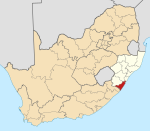Uvongo
This article needs additional citations for verification. (December 2009) |
Uvongo | |
|---|---|
 Uvongo | |
| Coordinates: 30°49′S 30°23′E / 30.817°S 30.383°ECoordinates: 30°49′S 30°23′E / 30.817°S 30.383°E | |
| Country | South Africa |
| Province | KwaZulu-Natal |
| District | Ugu |
| Municipality | Ray Nkonyeni |
| Main Place | Margate |
| Area | |
| • Total | 4.52 km2 (1.75 sq mi) |
| Population (2011)[1] | |
| • Total | 4,288 |
| • Density | 950/km2 (2,500/sq mi) |
| Racial makeup (2011) | |
| • Black African | 21.6% |
| • Coloured | 2.0% |
| • Indian/Asian | 4.4% |
| • White | 71.8% |
| • Other | 0.3% |
| First languages (2011) | |
| • English | 57.7% |
| • Afrikaans | 25.5% |
| • Zulu | 8.1% |
| • Xhosa | 5.6% |
| • Other | 3.2% |
| Time zone | UTC+2 (SAST) |
| Postal code (street) | 4270 |
| PO box | 4270 |
Uvongo is a seaside resort in the KwaZulu-Natal South Coast at the mouth of the in KwaZulu-Natal, South Africa. Uvongo is the largest upmarket residential area on the lower South Coast. The Vungu River has a waterfall that flows into a small gorge near the mouth. The town is named after the Vungu River,[2] which is derived from the Zulu word that describes the sound of a waterfall or the wind in a gorge.
Uvongo beach lost its "Blue Flag" title due to storms damaging it in April 2007 but has managed to regain a clean and prestigious beach front. Uvongo still remains the playground of the rich, with multimillion rand properties in the area. Uvongo is one of South Africas favourite holiday destinations and attracts local and foreign tourist.
The village of Uvongo still has its village-like charm, mainly thanks to building restrictions.[citation needed]
See also[]
References[]
- ^ Jump up to: a b c d "Sub Place Uvongo". Census 2011.
- ^ Jenkins, Elwyn (2007), Falling into place: the story of modern South African place names, David Philip Publishers, p. 76
- KwaZulu-Natal geography stubs
- Populated places in the Ray Nkonyeni Local Municipality
- Populated coastal places in South Africa
- KwaZulu-Natal South Coast


